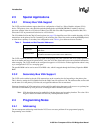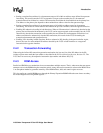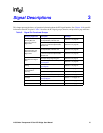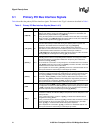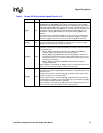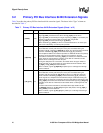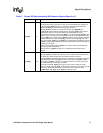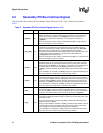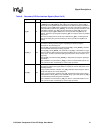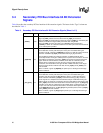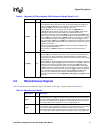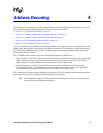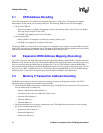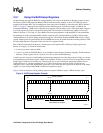
28 21555 Non-Transparent PCI-to-PCI Bridge User Manual
Signal Descriptions
3.3 Secondary PCI Bus Interface Signals
Table 8 describes the secondary PCI bus interface signals. The letters in the “Type” column are described in
Table 1.
Table 8. Secondary PCI Bus Interface Signals (Sheet 1 of 2)
Signal Name Type Description
s_ad[31:0] TS
Secondary PCI interface address and data. These signals are a 32-bit multiplexed
address and data bus. During the address phase or phases of a transaction, the
initiator drives a physical address on s_ad[31:0]. During the data phases of a
transaction, the initiator drives write data, or the target drives read data, on
s_ad[31:0].
When the secondary PCI bus is idle, the 21555 drives s_ad to a valid logic level
when its secondary bus grant is asserted.
s_cbe_l[3:0] TS
Secondary PCI interface command and byte enables. These signals are a
multiplexed command field and byte enable field. During the address phase or
phases of a transaction, the initiator drives the transaction type on s_cbe_l[3:0].
When there are two address phases, the first address phase carries the
dual-address command and the second address phase carries the transaction type.
For both read and write transactions, the initiator drives byte enables on
s_cbe_l[3:0] during the data phases.
When the secondary PCI bus is idle, the 21555 drives s_cbe_l to a valid logic level
when its secondary bus grant is asserted.
s_devsel_l STS
Secondary PCI interface DEVSEL#. Signal s_devsel_l is asserted by the target,
indicating that the device is responding to the transaction. As a target, the 21555
decodes the address of a transaction initiated on the secondary bus to determine
whether to assert s_devsel_l. As an initiator of a transaction on the secondary bus,
the 21555 looks for the assertion of s_devsel_l within five clock cycles of
s_frame_l assertion; otherwise, the 21555 terminates the transaction with a master
abort.
Upon completion of a transaction, s_devsel_l is driven to a deasserted state for one
clock cycle and is then sustained by an external pull-up resistor.
s_frame_l STS
Secondary PCI interface FRAME#. Signal s_frame_l is driven by the initiator of a
transaction to indicate the beginning and duration of an access on the secondary
PCI bus. Signal s_frame_l assertion (falling edge) indicates the beginning of a PCI
transaction. While s_frame_l remains asserted, data transfers can continue. The
deassertion of s_frame_l indicates the final data phase requested by the initiator.
Upon completion of a transaction, s_frame_l is driven to a deasserted state for one
clock cycle and is then sustained by an external pull-up resistor.
s_idsel I
Secondary PCI interface IDSEL. Signal s_idsel is used as the chip select line for
Type 0 configuration accesses to 21555 configuration space from the secondary
bus. When s_idsel is asserted during the address phase of a Type 0 configuration
transaction, the 21555 responds to the transaction by asserting s_devsel_l.
s_irdy_l STS
Secondary PCI interface IRDY#. Signal s_irdy_l is driven by the initiator of a
transaction to indicate the initiator’s ability to complete the current data phase on the
secondary PCI bus.
During a write transaction, assertion of s_irdy_l indicates that valid write data is
being driven on the s_ad bus.
During a read transaction, assertion of s_irdy_l indicates that the initiator is able to
accept read data for the current data phase. Once asserted during a given data
phase, s_irdy_l is not deasserted until the data phase completes.
Upon completion of a transaction, s_irdy_l is driven to a deasserted state for one
clock cycle and is then sustained by an external pull-up resistor.



